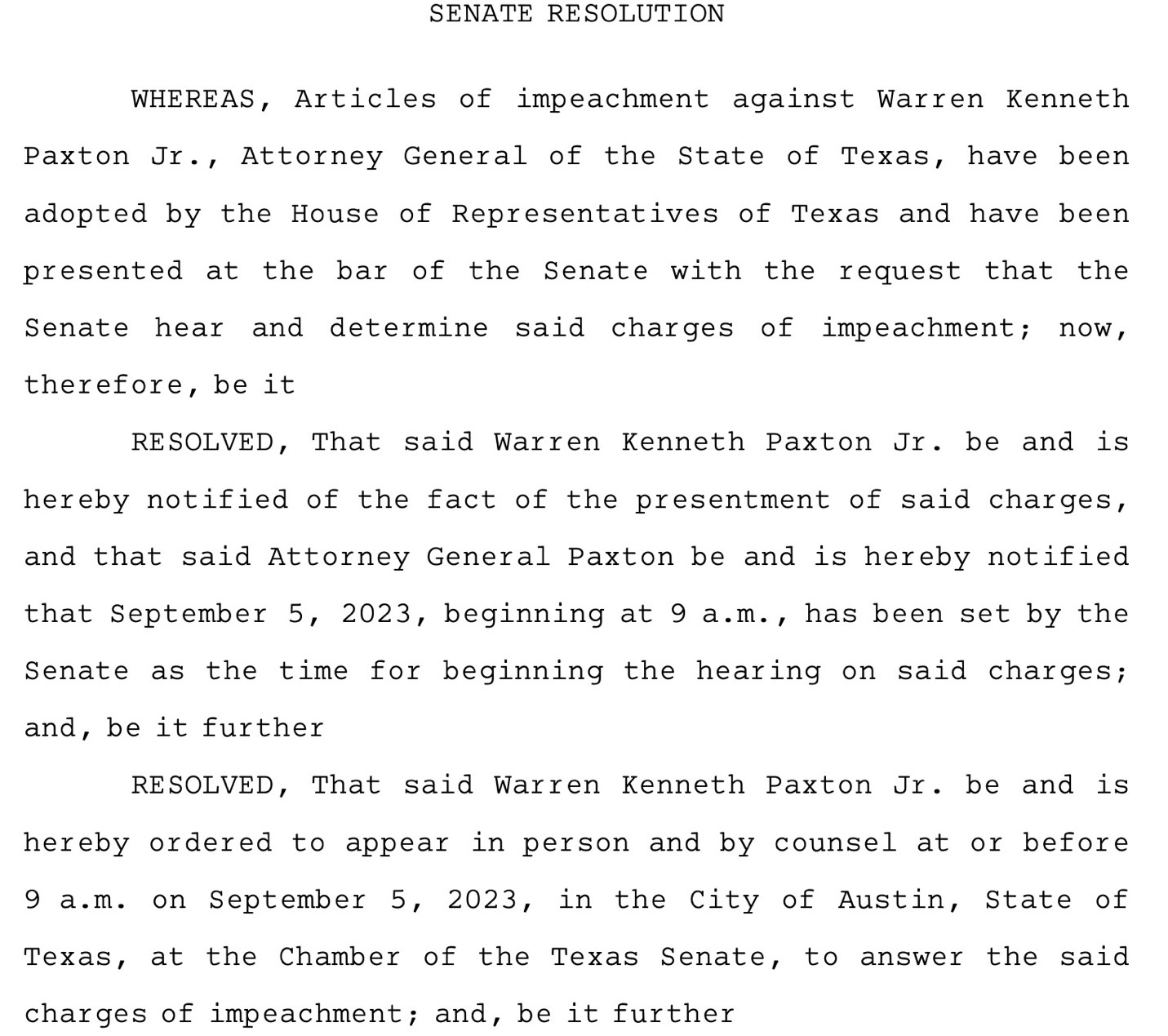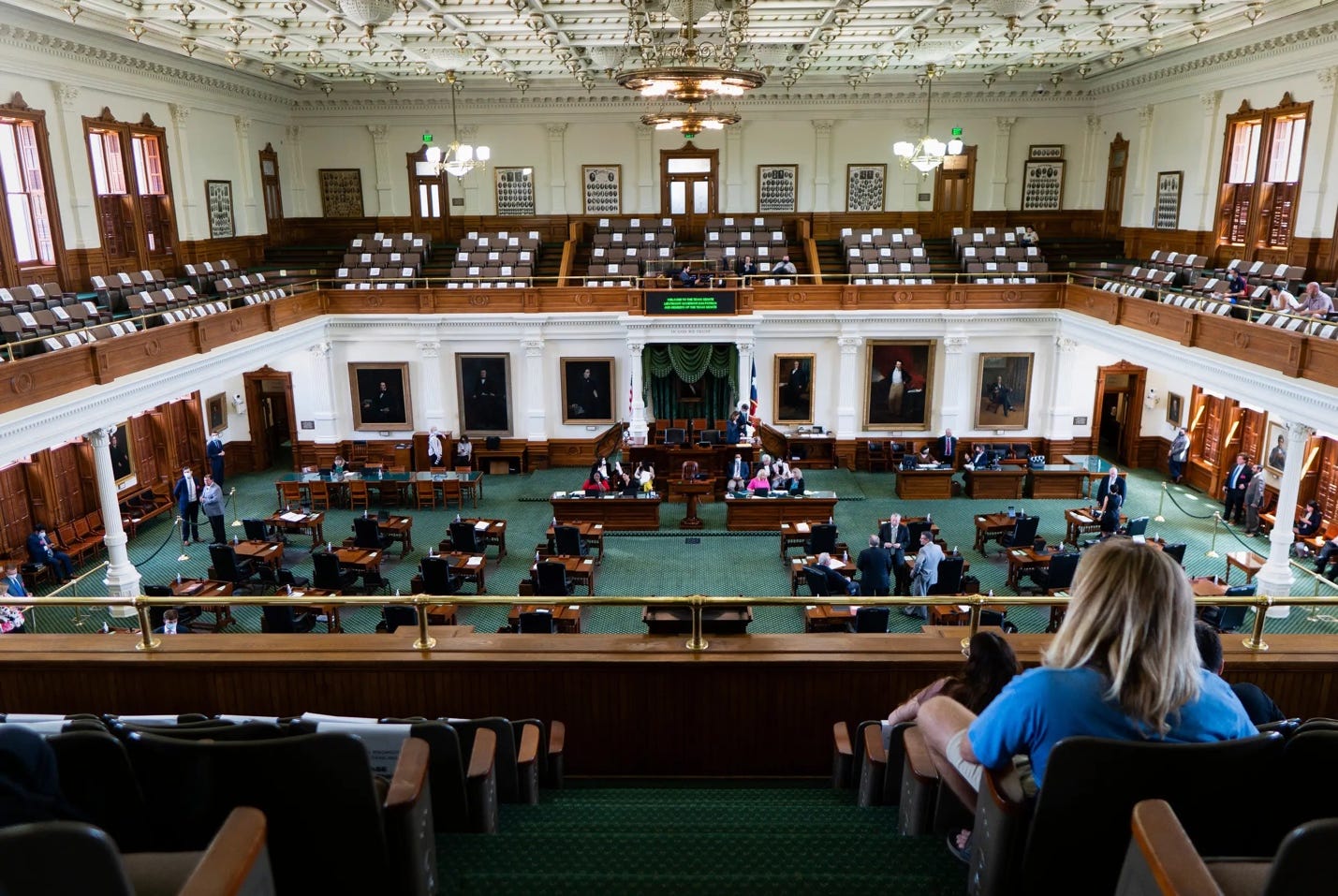Six Takeaways from the Senate Impeachment Rules
The Senate Impeachment Rules try to create the Illusion of Impartiality. Whether that really exists will be a function of how much Dan Patrick puts his thumb on the scale .
Welcome to another thrill-packed installment of Life Its Ownself. Your support encourages me to write and publish regularly. All my content is free for now, but your paid subscription is a big affirmation. Please let me know how I’m doing by 1) liking, 2) subscribing, 3) sharing with others, and 4) commenting below.
Bur first, your moment of Zen … The Senate Resolution commanding Impeached Attorney General Ken Paxton to appear before the Senate on September 5, 2023.
Thursday, June 22, 2023
After four weeks of work by a drafting committee and two days of often-tense closed-door deliberations, the Texas Senate last night adopted its “Rules of Impeachment of Warren Kenneth Paxton Jr., Attorney General of the State of Texas.” The final vote on the Rules was 25-3, with Senators Eckhardt, Hall and Paxton voting no. Eckhardt placed a statement explaining her oppositionin the Senate Journal.
The Senate also adopted, unanimously, Senate Resolution 36, commanding Ken Paxton to appear before the Senate “to answer the said charges of impeachment” on Tuesday, September 5, at 9:00 a.m. So we now know when the trial will begin.
There’s a lot to unpack in the rules, but here are six things you should know about them going forward:
1. The trial will not go on forever, and the party will end.
The trial will be conducted in three phases: pretrial motions and argument; the trial itself; and deliberations and decisions by the Senators. According to Rule 17, the middle part – opening and closing statements and presentation of evidence – will be limited to about 55 hours. So, knock on wood, the trial could be over by the end of September.
This contrasts nicely with the impeachment trial of District Judge O.P. Carrillo, which began on September 3 and ended in January of the next year.
2. Sen. Angela Paxton is recused from deliberations and voting, although she still counts as a participant.
Senator Angela Paxton is married to the defendant, Ken Paxton. For weeks, there has been speculation whether she would recuse herself. Rule 31 puts that to rest, declaring that “a member of the court who is the spouse of a party to the court of impeachment is considered to have a conflict pursuant to Article III, Section 22, of the Texas Constitution,” and therefore “shall not be eligible to vote on any matter, motion, or question, or participate in closed sessions or deliberations.”
So, Senator Paxton will sit through the impeachment trial, as required by Govt. Code Sec. 665.026: “Each member of the senate shall be in attendance when the senate is meeting as a court of impeachment.” But she will not be able to participate in the jurors’ deliberation or vote on any questions presented to the Senate (including, theoretically, any questions of procedure, admissibility of evidence, etc.).
The placement of Rule 31 – it’s the last one – seems curious, as if it were added on right at the end. Rumors abound that the provision was forced on Paxton by a big majority of the Senators, who thought her voting on her husband’s impeachment was unseemly.
She will be listed as present/not voting, which has tactical value. With her as the 31st Senator, 21 votes will be required to convict. If she was out, it would only take 20. As Mimi Swartz argues in an excellent Texas Monthly article, rounding up eight or nine GOP Senators to add to the 12 Democrats who presumably will vote to convict will be a challenge. Swartz argues that the formidable donor/activist resources of the Texas GOP, and especially its dominant MAGA wing, are arrayed in defense of Ken Paxton, subjecting GOP senators to a lot of pressure over the next few months.
3. The rules give Lieutenant Governor Dan Patrick extraordinary leverage over the process and its outcomes.
These rules vest much of the power over the proceedings in the Lieutenant Governor. He will make rulings on pretrial motions, admissibility of evidence, questioning of witnesses, etc. At his discretion, he may submit an issue to a vote of the sentaors, but the senators cannot compel a vote of the body on a ruling he has made.
It is important to note at this point that Dan Patrick is not a lawyer and has never even played one on TV. The Rules allow him to hire a legal counsel to assist him.
This begs the question that I’ve been asking since this all started: what does Dan Patrick want? Does he still view Paxton as an ideological and political ally who must survive this RINO attack, to the undying gratitude of Donald Trump and the MAGA hordes? Or is the like the other bosses, fed up with the unrepentant embarrassment Paxton has become to Texas and the GOP? Or is he committed to an impartial process, where the skill of the prosecutors and the wisdom of the Senate determine the outcome?
Students of Dam Patrick can make a case for any of these outcomes, although those who know him best worry the third outcome is the least likely.
4 The Rules overall favor the Defendant and make his acquittal more likely.
The Rules overall favor Paxton’s chances of acquittal – not in any “innocent until proven guilty” sense but in that they give unfair procedural advantage to the defendant.
For instance, although the impeachment managers must prove an article of impeachment beyond a reasonable doubt by a 2/3s vote, the defense can successfully dismiss a charge on a mere majority vote.
Thus, for example, the process could require the House managers to prove that Paxton compelled the A.G.’s Office to issue a bogus A.G. Opinion to prevent a foreclosure sale of some Nate Paul properties (Art. II) beyond a reasonable doubt by a 2/3s vote, but the defense could move to dismiss the charge that Paxton had given confidential FBI and DPS criminal investigation reports to Nate Paul, and it would require only a majority vote to dismiss it.
5 The trial is to be conducted publicly and broadcast, except for the deliberations.
Rule 9 says the proceedings of the trial (motions, testimony, etc.) will be open to the public, but not the deliberations. Nothing can be voted on in deliberations, and so all votes must occur in open session.
Dan Patrick infamously banned all media from the Senate floor a couple years ago, and that continues. Media will be “provided space in the Senate gallery and are to be allowed to cover the proceedings of the Senate of the State of Texas sitting as a court of impeachment when the court is in open session.”
6. Ken Paxton has a right to attend, but cannot be compelled to testify.
Ken Paxton has a right to be in the Senate Chamber during everything but the deliberations and voting, which are closed to the public.
He also had a right to testify in his own behalf, although it is highly unlikely he will. Remember, Paxton’s go-to strategy in all his legal woes has been to delay, delay, delay. Now, faced with a trial whose timing he cannot control, it would be unusual if he suddenly became a helpful witness.
And that is his right. There’s been some talk about whether he could be compelled to testify under an agreement that would grant him immunity from prosecution in state or federal courts. But I don’t see why the House impeachment managers would make that deal. Most of the impeachment articles rely upon testimony from the whistleblowers or other identifiable witnesses.
Of course, it’s possible the defense team could put him on the stand to testify to a particular event or conversation, but that would open him up to cross-examination, an outcome no one on the defense side wants.
And so it begins. More commentary on the Rules and the processes is forthcoming from Capitol insiders and the media; I will share what I think is relevant.
Pre-trial motions are due August 5, with answers by opposing parties by August 15 and recommendations from the Senate committee that drafted the rules due August 28.
Lists of all witnesses to be called must be submitted by August 23, although the public cannot see them. The high-powered lawyers for both sides – Dick DeGuerin and Rusty Hardin for the House, Tony Buzbee and Dan Cogdell for Paxton – will continue litigating the case in the media, which is really what they were hired to do.









It’s a great explanation, thank you for your expertise !!
Maria
What a mess. I sure hope they do the right thing. I don’t think they will but there’s always hope.